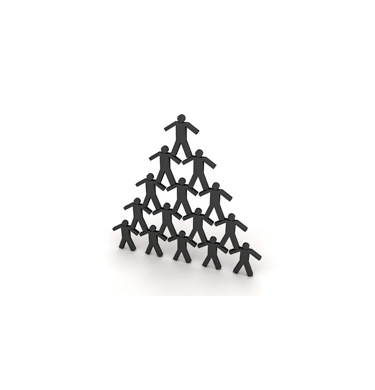


Episode 118 of “The $25,000 Pyramid” (syndicated nighttime version) opens with unabashed joy—a montage of shrieking contestants set against the hot baritone horn and funk-flute of the most whistleable theme song this side of “Jeopardy.” As special guest John Ritter enters, the pyramid, which will shortly be a sort of game-board, blinks aggressively and looks as if an avid Bingo-player has lovingly reconstructed The Luxor Las Vegas in his church basement.
Ritter's wearing a maroon cardigan over a pink shirt, unbuttoned jauntily at the top, and his hair (parted on the right, like mine is) seems intentionally messy. He hops onto the stage like a Vaudeville actor; that is, he looks like he's always in the middle of a pratfall, but he's smooth, too, and he greets his game show partner with some rakish kindness. They smile game-show smiles.
So, let's get started. Are we ready to play this game of association? One player gives the clues (“What ladies wear, not socks but. . .”), the other derives the meaning (“. . . STOCKINGS!!!”). It's Wednesday, the 17th of May, 1978. Everything is burnt orange and olive drab. Everything is mustachioed. My parents are the age I am now, my older brother is one year old, and John Ritter is still alive.
Host: “Okay, David, we want you to describe these Things Associated with $25,000 Pyramid. 30 seconds on the clock. Go.”
David: “Okay, a year that I've always been interested in.”
Partner: “1066? 1848?”
David: “No. A year closer to when I was born. Carter's President. Uh, there are lots of, like, hard-to-understand crises and thick-rimmed glasses. Oh, and the Bee Gees. Should I pass? The late-seventies, you know? They seem recognizable in some way, like I lived through them, and, in fact, those years are even more present to me than the mid-eighties when I actually was alive.
Partner: “1977?”
David: “Maybe that's because I want to have some connection to a pre-David world, which connection would make me feel older/stronger/better than I am. I want to be alive when my parents were in their prime, in their first house, stretching the ketchup. Before another kid, me, started to tire them out and they had to move and my dad had to take on longer hours at the nuke plant. Before there were four of us. Back when they watched “‘Three's Company’ on Tuesday nights and ‘Pyramid’ on Wednesdays. Well, anyway, that era seems both foreign and familiar to me. Like Canadians.”
Partner: “I really think you should pass.”
David: “I guess what I'm saying is that Olivia Newton-John and John Paul I, Anwar Sadat and flashing pyramids, Three Mile Island and unalloyed sincerity were influencing my parents right when they conceived of me. So, somehow, I think they're part of my personal history.
Oh, and this is the particular year when John Ritter appeared on '$25,000 Pyramid' for the last time. You know. . .”
Partner: “1978? 1978!!!”
David: “Right. It was a great season for 'Pyramid.' Next clue. Uh, it's the most points you can get in this game.”
Partner: “21!!!”
David: “Yes, right. Okay, next. 'Pyramid' won this award nine times.”
Partner: “Best Game Show.”
David: “No, the name of the award.”
Partner (arms pumping): “Emmy. EMMY!”
Host: “Ohhhh, you've run out of time, but you have three. Three points.”
“The $25,000 Pyramid” wasn't for playing along; the answers were right there on the screen for the home viewer. No, the show was purely for the pain, joy, and pain/joy of watching someone flail for information you already knew. This exercise in rapid-fire dramatic irony ran for 4,270 episodes, but it's middle-period “Pyramid” ('78-'81) that really excites me: the tacky set, the wacky B-list celebrities (sorry John), and that easy-going flirtation that seems specifically '78—still chauvinistic, but in a sweet kind of way, more sexish than sexy.
In episode 118, for instance, John Ritter and his partner—the improbably named Batesy Bates—kiss six times and hug (with rubbing) for a total of 34 seconds. But all this is in the context of G-rated innuendo. At one point, our host, Bill Cullen, hearing that Batesy owns a t-shirt shop, suggests that “John Ritter'll wear them if you give 'im half the chance,” and the crowd whistles, as if putting on more clothes will get John Ritter hot. As if the idea of John Ritter as a Lothario could really make sense at all, this guy whose general guilelessness and dimple-swallowed face seem about as racy as an oatmeal cookie.
He's great at the game, though. So is Batesy (like, savantishly great), and the way they finish each other's—SENTENCES—leaves them almost—POST-ORGASMIC!!!—and definitely—MINDBLOWN. For example, after they succeed in the First Winner's Circle, we see the following actions:
There's a four-second hug.
Batesy yelps three times.
John Ritter rolls his eyes back in his head and falls over on the thickly-carpeted sound-stage (his main comic skill).
A swaying, eight-second hug.
[The theme song, which I fervently believe will play like elevator music on the Sub-Level of Heaven in which God indulges my most unorthodox nostalgias, continues throughout].
“Oh my God!” they shout.
A kiss, their fifth; soul-eyes; body tremor.
Batesy's doubled over with Ritter-love and cash-money.
And John (this is too much for him) seems to say (improbably, inaudibly) that he feels like he's “Inside Hiroshima.”
After their win, John Ritter declares, “We would like to announce our engagement.” It's impossible not to grin, and Batesy might believe him about the nuptials. That's how well her 15 Minutes of Fame is going. She's flushed and nice, with nut-brown hair halfway down her back and a pretty, square smile. But she's frightening, too, the kind of girl who might send a guy—after a perfectly normal date or perfectly abnormal game show victory—a love letter written in bird blood. Such is her intensity: dilated eyes, blaring voice, frenzied gestures. She so frazzles the host, Bill Cullen, that he calls her “Beetsy Baez.” And after that mistake, John Ritter teases Bill Cullen by calling him “Bob.” Batesy loves John Ritter. I love John Ritter.
Right? I think I do.
David: “Okay. My brother and I used to watch reruns of this show when I was little—man, I loved staying up with Stephen, eating Schwan-brand frozen pizzas in the basement, and getting him to laugh. And every episode is built around a simple misunderstanding, but they're all so uncomplicatedly satisfying, you know? Jack Tripper?! Its re-runs are on at 3 a.m., and, sometimes, after the infomercials for Time Life Music—“If I can't have you, I don't want nobody baby”—I still catch one.
Partner: “'Three's Company.' Go, go.”
David: “Okay, so this is how John Ritter looked when he and Beetsy, I mean Batesy, lost $15,000 in the Second Winner's Circle. They were down to the last clue, ‘Things That Are Tough,’ and he kept stammering about 'weightlifters,' and when time ran out, well, it just all went out of him. They stood around for an awkward minute—Batesy and John. They should have been hugging, consummating their win, and they knew it. I should have been grinning, but it's impossible not to feel bad. And Bill Cullen says, ‘Won't you come back and see us again, John?’ and John Ritter says, ‘I will,’ but he never does come back. Because he hated to let Batesy down, this person who'd loved him so impractically. He looked. . .”
Partner: “Stricken. Guilt-ridden! DEVASTATED. DEVAST-ATED!!!”
David: “Yes. Okay, third clue. Um, this is a terrible day for our nation, and on the second anniversary of this day John Ritter died (on the CNN news-ticker). That happened, and my girlfriend was breaking up with me—the long-term one who'd always said 'I hate comedy'—and when I sat there watching, I felt my life's most peculiar emotion. I was sad about John Ritter on that of all days, and when I thought, 'Man, this time of the year is always shitty,' I knew my grief over a comedian was some grotesque parody of the patriotic pity I was supposed to feel. But it was kind of like his heart failure was a really poor, really poignant metaphor for what I was going through: the partial-death of silliness and simplicity and sexishness. And here I was, 21, slumped over, not because any towers had fallen, and not because I was in the midst of a week-long dumping, but because now there'd never be a 'Three's Company' reunion.”
Partner: “. . .”
David: “And because this guy who, let's be honest, I'd used as a punch line for years . . . This guy, who with his flamboyant, kind manner had become, like, my celebrity avatar . . . This guy was dead, collapsed. A pratfall. And all I wanted to do was go home and watch a day's worth of old TV with my brother—my brother who'd moved out years before. I wanted to be in our basement, where no matter what the problem was, it always got solved in the 23rd minute, right before that sweet theme music, hot horns, funk-flute.”
Host: “Ohhhhh, time she's up. Time. Is. Up. The answer was September 11th. Yes. John Ritter died on Septemberrrr. 11th.”
I don't always know what I love. I'll hear myself saying to my wife, “Sweet, ‘Taxi,’ we're watching this.” Or I'll emphatically turn up the volume of Carly Simon's “Anticipation” without being able to tell if I'm joking. I sing, “These are the good old days,” but do I believe myself?
Often, I can't own my own taste, taste being wrapped up as it is with cockiness, hipster-osity, and possible future embarrassment: I can't believe I liked those guys, cherished this game show, espoused that political philosophy. And meant it all so innocently. I live in fear of my retrospective self and so maintain a slippery pose in the present. Do I love John Ritter, or am I just being clever?
In a great scene from “The Simpsons,” one teenager questions another: “Are you being sarcastic, dude?” and the second answers, “I don't even know anymore.” And this all makes me think of what Episode 118 of “The $25,000 Pyramid” really exemplifies: the bald sincerity that drives John Ritter and the gorgeous-loud Batesy Bates. So enviable and so scary.
Partly, Batesy Bates seems like Norman Bates, but also like the kind of person I'd hope to be: forthright, unashamed. She and John Ritter look directly at each other. They feel grateful for their parting gift of four gallons of True Value latex paint and a can of Durkee French-fried onions, no smirking. They flirt and kiss and generally carry on, as People Who Are Unafraid.
After answering 32 out of 32 clues correctly, John Ritter and Batesy Bates falter. The word is “Emergency.” Ritter, describing a cancelled television program of that na me starring Robert Fuller (I never saw it), loses his concentration. After they earn only five points, he sheepishly explains about his “Emergency” mistake: “Well I started to get into TV, but it's off the air. God rest his soul.” In this moment, he seems like a good man, undeniably, and when they lose together on “Things That Are Tough,” he's so sorry, too.
The theme music blares but gets turned down immediately. It seems irreverent now. And John Ritter can tell—I know this feeling—that a joke won't quite make it right, that all he can do is stand there, offer one more earnest hug, and go off the air.

